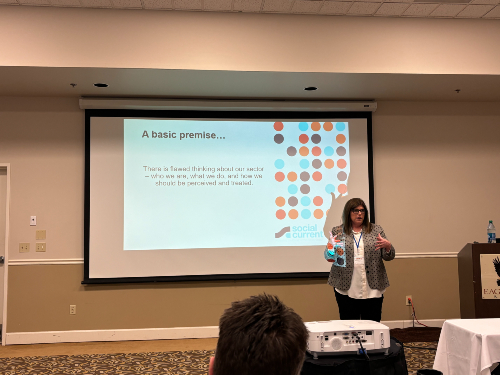|
Oregon Alliance
Oregon Child & Family Center for Excellence
2025 Summit Recap
   
2024 Annual Summit
A huge thank you to our sponsors and attendees for this year’s Summit! Our members and community partners stepped up and helped to make this Summit a huge success.
We were thrilled to host our 3-day-long Summit at the beautiful Eagle Crest Resort in Redmond again this year. We’ve found that the surrounding Central Oregon landscape and golfing opportunities at Eagle Crest to be hard to beat!

The first day of our Summit on Wednesday heralded two sessions that our attendees could choose from: “Addressing the Impacts of Vicarious Trauma in Organizations” by Rebecca Peatow Nickels and “Building a Lived Experience Workforce: It’s Complicated” which featured a panel of presenters, including our very own Jonah Harris from the Center for Excellence.
Nickels’ presentation on “Vicarious Trauma” was focused on the effects of consistent exposure to trauma within workspaces and how to address these feelings among workers on an organizational level. This topic helped its listeners understand how to balance the rewarding nature of helping vulnerable individuals who have been impacted by trauma while simultaneously having an internal support system to limit vicarious trauma. Nickels had brought her experience in using trauma-informed approaches as she helps develop and consult organizations and their leaders.

The “Lived Experience” presentation was led by seven experienced individuals from our member organizations, including Kendra Phillips-Neal and Anna Bontrager from Jackson Street Youth Services; Drew Williamson and Korie Cochran from Boys & Girls Aid; Rosie Laurie from J Bar J Youth Services; and Jonah Harris and Vera Stoulil from our own Oregon Child & Family Center for Excellence. This group helped lead this session by defining what “Lived Experience” means within organizations and how it affects individuals in the workforce. This presentation was backed up by extensive research conducted by the Center for Excellence, including staff surveys of participating service providers.

The second day of our Summit was chock-full of important presentations and sessions, and we were very excited to kick off the day with our keynote presentation by Jody Levison-Johnson, titled “Meeting the Moment: The Youth Mental Health Crisis and the Role of Community-based Health Organizations.” With the rise of youth mental health needs across the country, it has become an unavoidable topic to discuss the contributing and underlying factors that are leading to these issues. As the CEO of the nationwide nonprofit “Social Current,” Levison-Johnson had brought her wide range of experience in work such as social work, field research, and system reform efforts.

Following our keynote presentation, we were joined by a panel of state agency partners to discuss “Collaborations Across Systems” through sharing policies, practices, and initiatives across statewide systems of care to support youth and families in Oregon. Our panelists included Dr. Charlene Williams from ODE; Molly Miller from ODHS; Chelsea Holcomb from OHA; Andrea Bell from OCHS; and Sandra Santos from OYA.

Our Luncheon presentation was hosted by Dr. Randy Kamphaus and Courtney Westling from the Ballmer Institute. They covered the Ballmer’s efforts to create new models of thought and action addressing children’s behavioral health challenges in the Pacific Northwest through effective research and evidence.

After our Luncheon, we were joined by Leah Brookner to lead her presentation: “Attachment Theory and Systems Theory: Aligning Relationships to Enhance Organizational Functioning in Working with Trauma.” Brookner reviewed different key concepts from both Attachment and Systems Theories with a specific focus on trauma at individual, community, and macro levels. With these concepts in mind, this presentation also drew from Brookner’s past experience in child and family therapist centers to focus on how relationships can be used for healing and sustainability.

Our final presentations of the day were broken up into two sessions: “Ecological Systems Theory in Action: Using Eco-Maps to Assess and Understand Community Needs” by Leah Brookner and “The State of Nonprofits and Rethinking Funding Models” by Jody Levison-Johnson.
Brookner’s presentation was tied back to her “Attachment and Systems Theory” session through using relationships-as-resources to create both personal and community-focused Eco Maps. This interactive session also focused on both the power of connectivity as well as its drawbacks.

Levison-Johnson’s presentation homed in on specific strategies for supporting and creating effective responses to the mental health needs of young people. Using her past experience in county and state governments, Levison-Johnson helped offer insights into how to reconsider funding models within organizations.

We wrapped up on Thursday with our Board Chairs’ Reception, where we presented the Rose Otte Children’s Champion Award to the well-deserved Dr. Ajit Jetmalani. Dr. Jetmalani was this year’s recipient due to his unwavering efforts to improve the lives of children and youth throughout Oregon through demonstrated leadership, innovation, and commitment to our community. We were very happy to have Dr. Jetmalani join us to receive his award and join us for the following festivities, including a lively Jeopardy game held by Jonah Harris and Erica Keaveney from the Alliance and Center for Excellence. Then the night was wrapped up with our friendly poker tournament which helped raise $125 for our Kid’s PAC.

Thank you so much again to EVERYBODY who attended our Summit and helped make it our most successful one yet. We look forward to seeing all of you (and more!) at next year’s Summit!
|